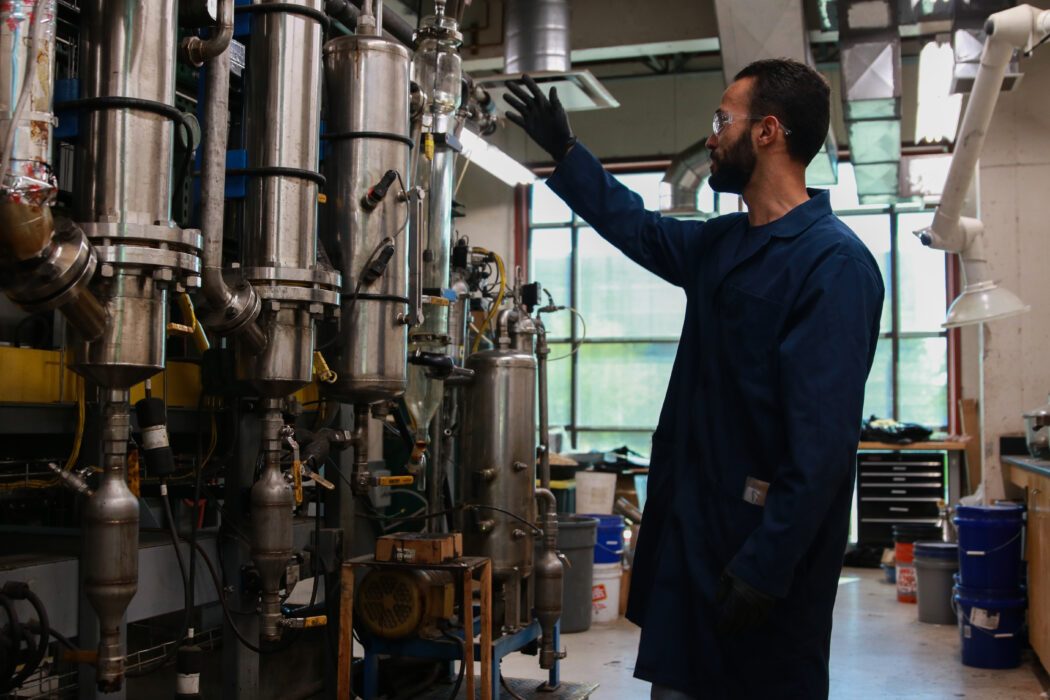USU scientists create jet fuel from Juniper tree saw dust
Researchers at Utah State University have been working tirelessly on creating what they believe is a clean, burning jet fuel created by Juniper Trees.
Professor Foster Agblevor has been leading the research in biofuels ever since he moved to Utah and became a Utah Science, Technology and Research, or USTAR professor at USU.
“When I first moved to Utah, I asked myself, what kind of tree stock does Utah have?” Agblevor said. “So, I looked around and finally found out that Utah has a problem with Pinyon-Juniper, in that they are considered invasive species that have been taken over the grazing lands,” Agblevor said.
The process of creating this fuel includes grinding the wood from the trees into a fine sawdust-like substance. After the wood is particle size, researchers at USU will put the sawdust into another machine, turning it into bio-crude. From there, this bio-crude is eventually converted to usable fuel.
“It looks like any other type of petroleum crude,” Agblevor said. “The only difference is that it comes from wood and smells nicer than petroleum crude.” Agblevor said.
After creating the fuel, the team at the Innovations campus, USU’s premier research park, tested the fuel.
“We test it on a small stack of two-stroke engines, like weed whackers,” Agblevor said. “On a larger scale. W, we are looking for companies that are willing to invest.”
Agblevor wants companies to invest so the team can test the new fuel in airplanes.
“We don’t see any difference between our fuel from the juniper and fuel from petroleum,” Agblevor said. “So we think you can fly in a plane, and it will work effectively. But we have to get some of the plane guys to come and actually test it on some twin engines,” Agblevor said.
Besides being innovative, juniper fuel is also better for the eEarth.
“So what you have is almost a perpetual cycle,” Agblevor said. “That means the plant captures the CO2 regenerates it, and then uses it to store it as a tree until you convert it to fuel. Whereas if you go to petroleum, it’s a one-way street. It releases the CO2 into the atmosphere. There is no way of getting it back into the form it used to be. A tree you can have a complete cycle. Petroleum, you don’t have a complete cycle so that petroleum is doing more harm to the environment.”
Agblevor claims that making juniper trees fuel is better because it burns cleanly compared to petroleum.
“Petroleum has sulfur,” Agblevor said. “So when you burn it, it releases a lot of sulfur dioxide into the atmosphere. When water makes it through sulfur dioxide, it gives us sulfuric acid, and that’s doing a lot of damage. It gets into our water sources and all that. Biomass is better than sulfur. “” So when you burn the aviation fuel from the biomass, you are not doing any harm to the environment. So overall, when you look “at it, if you produce your jet fuels, aviation fuels from biomass, you will never lose in any way.”
Agblevor hopes to see his juniper fuel on the market in two to three years.
“So we just need investors. If we get an investor today who says okay, I think within a year we should be able to design an operating system.” Agblevor said.

